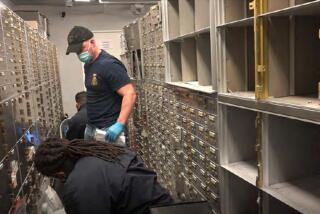FBI Erred in Porn Arrests, Judges Rule
NEW YORK — Two federal judges have dealt a potentially crippling blow to a nationwide Internet child pornography crackdown, saying the FBI recklessly misled judges to get search warrants that were used in making more than 100 arrests.
Constitutional safeguards cannot be relaxed just because “the crimes are repugnant,” said U.S. District Judge Denny Chin in New York as he dismissed evidence obtained against one defendant. Chin’s ruling, dated Wednesday, was released publicly Thursday.
U.S. District Judge Catherine Perry in St. Louis, throwing out evidence against another defendant Thursday, said “false information was recklessly included in the search warrant application.”
The judges each cited constitutional flaws in the investigation, dubbed Operation Candyman, and they noted that the FBI and prosecutors have acknowledged making errors.
The rulings could affect dozens of defendants in the crackdown announced by Atty. Gen. John Ashcroft a year ago. Police officers, clergy members and an Army sergeant were among those arrested.
Chin called the intrusion of privacy by the government “potentially enormous.”
“Thousands of individuals would be subject to search, their homes invaded and their property seized, in one fell swoop, even though their only activity consisted of entering an e-mail address into a Web site from a computer located in the confines of their own homes,” he wrote.
Defense lawyers said both judges considered new evidence that demonstrates the FBI recklessly used erroneous information in its search warrant applications. Nearly identical applications were used in cases across the country.
“It’s significant,” St. Louis lawyer Daniel Juengel said of the rulings, including one dismissing evidence against his client. “The government can’t just come in and search your house based on something you may have inadvertently clicked on in your computer.”
Michael Kulstad, a spokesman for federal prosecutors in New York, said Chin’s ruling was being reviewed and prosecutors had not decided whether to appeal. An FBI spokesman did not immediately return a call seeking comment.
More to Read
Sign up for Essential California
The most important California stories and recommendations in your inbox every morning.
You may occasionally receive promotional content from the Los Angeles Times.










